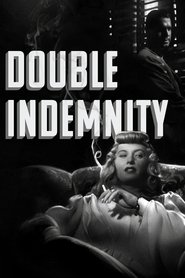Notwithstanding Double Indemnity's many, many merits, at least two elements of the film's production help sustain its impact over 80 years on. To begin with, the sets, like in many noirs of the time, feel transient. They look very slightly 'off' in a way that artificial sets tend to do without the application of huge resources. This uncanny environment detracts in other films that are otherwise attempting convey an authentic feeling of domesticity — 'warm family homes' and the like. Whilst, in noir, and in Double Indemnity, it subtly amplifies the unsettled atmosphere. (See also: 1945's Detour.)
Secondly, the production code — known more commonly at the time as the Breen Office — would obvioulsy not have permitted Neff and Mrs Dietrichson to consummate their relationship on screen. But doesn't the idea of Mrs Dietrichson 'holding out' on Neff somehow make it more likely that Neff would agree to such a murder? And not simply more plausible from the perspective of the plot, but perhaps even relatable? It would not be too indelicate to suggest that most men might be able to remember a time where they have done something very silly for a woman they were, err, waiting for.
It may not be too much to say [that] like the subsequent Sunset Boulevard it is a drama about light, about a man lured out of the sunshine and into the shadows.In Cain's story, we vaguely understand the demon claims investigator [Keyes] to be a sort of father figure to Walter. But he is a distant and somewhat menancing one. In the movie their relationship is much warmer, and is set forth in much richer detail. "It's the love story in the picture," as Wilder put it. He was not exaggerating.
One morning [Wilder] finished, or so he thought, the little nothing of a scene in which Walter and Phyllis, having disposed of her husband's body, start her car and head home. He broke for lunch, and went to pick up his own car in order to drive to the Brown Derby. When he got in, he found it wouldn't start. He leapt out and started running back across the lot to his stage, praying the grips had not yet dismantled the set. Luckily, they had not. Wilder ordered retakes in which the murderers, desperate to make a quick getaway, are momentarily, suspensefully, halated by a faulty ignition.
Some of the film's initial power may have been the result of another lucky break — the timing of its release. One has to think that in this wartime period, the contrast between Double Idemnity's hardness of spirit and the sentimental, patriotic pieties in which American movies had been trafficking was simply refreshing to its first viewers, a slap in the face with a cold towel.
Wilder once said it was his favourite film. Asked to explain himself he said simly: 'It has the fewest mistakes.
— Richard Schickel: BFI Film Classics: Double Indemnity (2019)
For all the film’s stylistic innovations and punchy dialogue, the unique relationship between Walter and Keyes turns this lowdown tale of murder and lust into a tragedy. Walter tries to meet the expectations he’s set for himself based on his admiration of Keyes. But this leads to the heartrending moment where Keyes lights Walter’s cigarette in his last moments.
— Brian Eggert (Deep Focus Review)
[The] insurance company [is] icon of capitalism's stability, which in Double Indemnity is exposed as a spiritually bankrupt context for its death of a salesman. From the old geezer elevator operator whom the insurance companies wouldn't insure, to Sam Gorlopis, the immigrant trucker who burns his truck for naught, to Keyes, the sour and lonely middle management of the Pacific All Risk Insurance Company, to his strutting and incompetent supervisor, the son of the company's founder, the image of American business and life created in the film is consistently bleak. The most telling moment comes when Keyes offers Walter a promotion to assistant claims manager. Keyes is pitching the job as a holy pursuit in the ethical life when Phyllis calls, breathlessly rehearsing plans for the murder of her husband. Walter wants no part of hard work, fair play, a step up the ladder.
— Jim Kitses: Gun Crazy (BFI Film Classics)
The logic of insurance, the method or operating code of insurance, beats at the heart of the language Walter and Phyllis use to articulate their escape from a world of all risk. Insurance—the idea of insurance, the logic of insurance—has wormed its way into the very fantasy of its escape or defeat. The fox wasn’t so much let into the henhouse; to stretch the aphorism a bit, the fox designed the henhouse. Or think, too, of the fact that on his original house call, Walter enumerated all the varieties of insurance the company sold, “all kinds […] right down the line.” Right down the line—again. Like a Coen brothers character who hears an expression and then starts automatically repeating it elsewhere out of context, Walter’s articulation of his and Phyllis’s catchphrase was always (under)written by insurance. Of course, since this is a classic noir, their dream doesn’t come to pass. It wasn’t even their plan. Walter was only ever Phyllis’s useful idiot. Put differently, she had taken out her own insurance policy in the form and person of Nino. Her bets (on Walter) were always hedged, or, in the lexicon of the industry, “reinsured,” even as it’s left ambiguous whether she ever intended to leave with him. In playing both sides, Phyllis had secured her risk.
— Travis Alexander (Los Angeles Review of Books)

